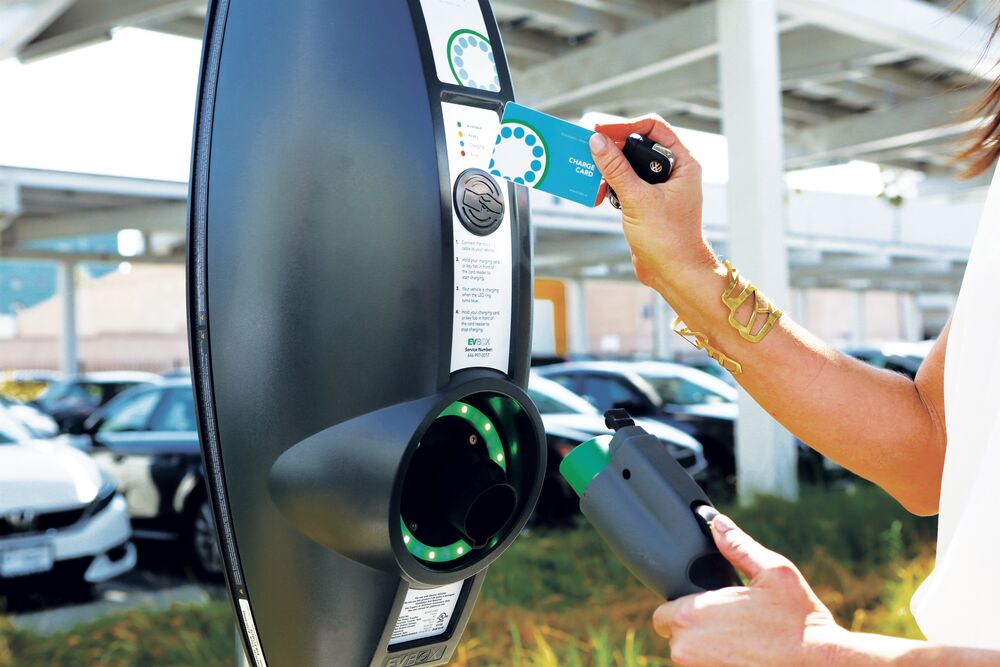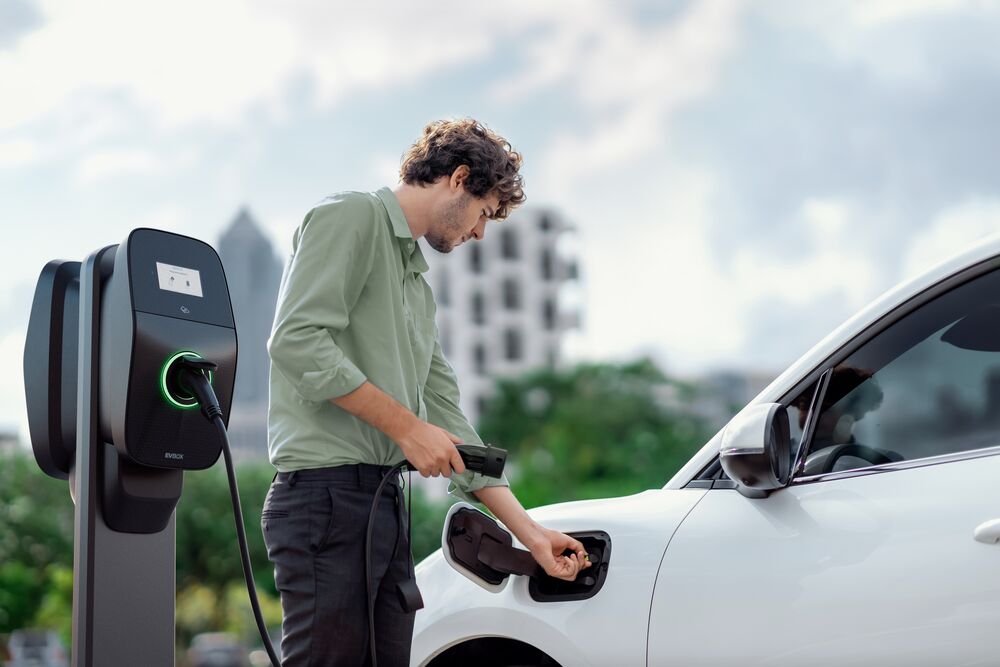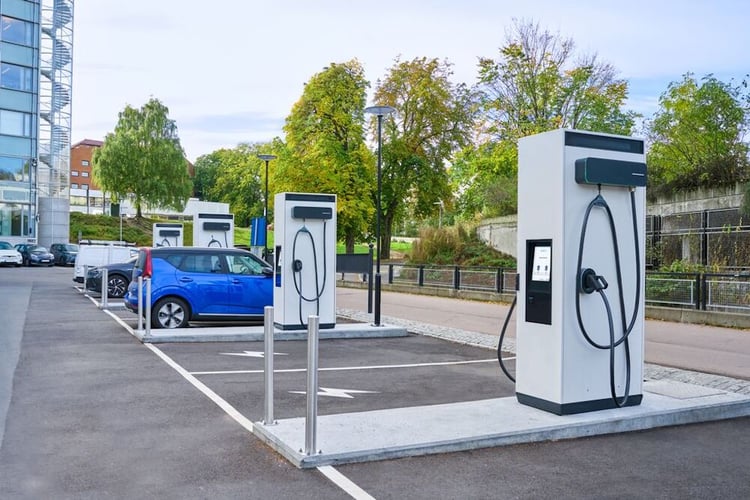
Last updated on 23rd March, 2023
While you still may be questioning if you should buy an electric car, it’s possible that your employees already made their decision.
In fact, in 2022, 17% of new car sales in the UK were electric and one of the preferred charging locations for drivers aside from the home is the workplace. Offering EV charging solutions at work will not only show that your company is environmentally conscious, but it can also help you boost employee morale in these five ways:
- Offering a convenient solution for your employees
- Boosting productivity
- Attracting and retaining top talent
- Helping reduce yours and your employees’ carbon footprint
- Helping employees claim incentives
By stepping up to support EV drivers, your business has the potential to reap many benefits. Not only can EV charging provide your brand with a competitive edge, but it can also benefit your employees and customers, and lay the groundwork for a greener future. Read more to learn how EV charging stations can help you boost employee satisfaction at the workplace.
1. EV charging at work is convenient

When it comes to workplace charging, offering convenience for your employees is one of the most obvious benefits. Instead of relying on home charging stations, EV drivers would like to have the ability to charge wherever they are. Known as the top-up model, this approach means charging practically anywhere; at home, work, in the city or on the road.
The main reason EV drivers prefer this model is that it eliminates the fear of range anxiety. While running out of power in the middle of nowhere is unlikely given that in the UK drivers only drive an average of 20 miles a day, providing employees with a place to charge at work gives them a peace of mind.
Plus, as 38 percent of UK EV drivers think charging is too time-consuming, by allowing employees to charge during office hours, they can allocate their time more efficiently. After the working day, their electric car will be fully charged and your employees can get back on with their life outside of work with ease.
What’s more, not all EV drivers have access to home charging, making workplace charging even more essential. Providing EV charging for your employees demonstrates your business is a responsive and committed employer. This brings us to our next point:
2. EV charging at work improves productivity

It’s the little things that matter when it comes to boosting employee productivity—and pleasing employees with EV charging has the potential to do just that.
Thanks to offering the convenience of charging at work, you save your employees time and worry. With less time wasted searching for a place to charge, your employees are more likely to be on time (think of all those valuable hours of productive time added back to an employee’s day). They may even work a little longer to wait for their EV to fully charge.
Moreover, providing your employees an amenity they truly need can make them feel valued. Employees who feel valued by the business are more engaged and productive. This all adds to your EVP – your employee value proposition, a benefit that goes beyond the salary your workers get at the end of the month.
With a deeper level of trust and security at work, your workforce will have more energy to create value back to your company—a win-win for your employees and your business.
3. EV charging helps to attract and retain talent

Alongside keeping your existing workforce happy and productive, adding EV charging can also play a part in attracting and retaining talent. More and more, employees expect their workplace to be socially and environmentally conscious. In fact, a study by Gallup found that 71% of workers consider a company’s environmental record when deciding on an employer.
It makes sense then to see that improving a facility’s image is one of the top five issues on the agenda for facility managers. With energy-efficient buildings earning major “PR points” in the public eye, certifications like LEED and BREEAM are highly sought after—and guess what earns certification points? EV chargers, of course. Plus, EV charging stations are a much more visible solution for those who are just passing by––they literally stand out in your parking space, and can be designed to include your logo, being a further advertisement of your climate-positive actions.
Therefore, installing EV charging stations at your workplace is an effective way to showcase support for innovation and improving the environment. Approximately six out of ten (potential) EV drivers think electric cars are part of the solution to fight climate change. This means you can attract talent who share a passion for the issues you're trying to solve. Moreover, you can enable employees to play a key role in accelerating the global EV movement.
4. EV charging helps employees reduce their carbon footprint

Transport represents 24 percent of the UK’s total carbon emissions in 2020 and is the main cause of air pollution in cities. About six in ten people among the general public say reducing CO2 emissions in transport is important to them and experts broadly agree that electric cars produce a lower carbon footprint over the course of their lifetime than their fuel-guzzling counterparts. With technology advancing, and electric car production improving, these CO2 emissions are set to reduce even further.
By offering workplace charging infrastructure, you can significantly reduce your carbon footprint from employees and customer travel. For companies with a lot of employees, emissions from employee commutes add up quickly. More than that, you will be encouraging employees to transition to EVs, which can make a serious impact when it comes to reducing emissions.
What’s more, if EV’s are powered by your building’s solar installation, they’ll emit 90 percent less harmful emissions throughout their lifespan than conventional cars.
5. EV driving employees can claim a range of incentives

Government’s around the world are committed to increasing the number of electric cars on the road to meet ambitious climate change targets. To reflect this priority, the way vehicles are taxed offers a range of incentives for companies and EV-driving employees alike.
Several EU member states apply CO2-based taxation to passenger cars. There are many variations. In the UK for example, the government introduced tax cuts for employees using corporate EVs for personal use. What’s more, the government covers up to 75% of the costs of purchase and installation of EV charging stations at workplaces.
Similarly in Ireland, the government offers a 'benefit-in-kind concession' for electric company cars with a market value of less than €50,000.
The future is electric
The electric mobility movement is not slowing down. To lead the pack, offering workplace charging facilities now is essential. Doing so will bring your business (and employees) a multitude of benefits—and position you as a responsible leader in innovation for years to come.
Discover more about EV charging for workplaces
Now that we've discussed the five main benefits of offering EV charging at the workplace, you might want to learn more about the challenges or trends that affect workplaces switching to electric mobility. Check out our complete guide to understand more about this important topic.
Related articles

How to install EV chargers at the workplace?
Regardless of the type or model of charger you choose (or how much one costs), installing EV charging stations is...

What do workplace EV chargers cost?
On average, AC workplace EV chargers tend to cost around £1,100 per charge port (excluding installation costs)....

How to prepare your workplace for installing EV chargers
Installing EV charging stations at your workplace is a significant investment, so it’s important to consider the...